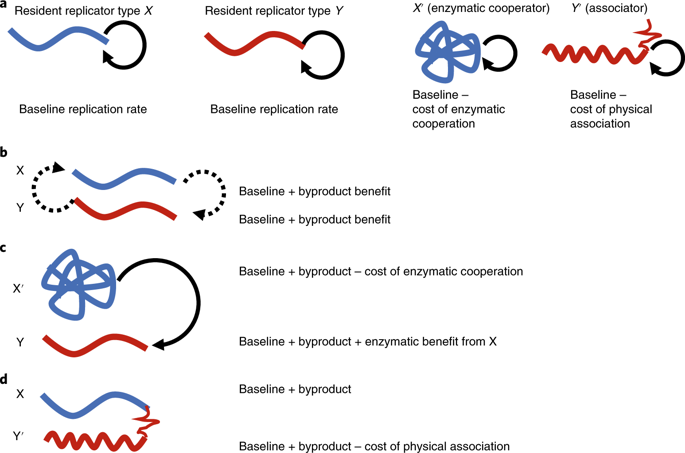当前位置:
X-MOL 学术
›
Nat. Ecol. Evol.
›
论文详情
Our official English website, www.x-mol.net, welcomes your
feedback! (Note: you will need to create a separate account there.)
The social coevolution hypothesis for the origin of enzymatic cooperation.
Nature Ecology & Evolution ( IF 13.9 ) Pub Date : 2019-12-16 , DOI: 10.1038/s41559-019-1039-3 Samuel R Levin 1 , Sylvain Gandon 2 , Stuart A West 1
Nature Ecology & Evolution ( IF 13.9 ) Pub Date : 2019-12-16 , DOI: 10.1038/s41559-019-1039-3 Samuel R Levin 1 , Sylvain Gandon 2 , Stuart A West 1
Affiliation

|
At the start of life, the origin of a primitive genome required individual replicators, or genes, to act like enzymes and cooperatively copy each other. The evolutionary stability of such enzymatic cooperation poses a problem, because it would have been susceptible to parasitic replicators that did not act like enzymes but could still benefit from the enzymatic behaviour of other replicators. Existing hypotheses to solve this problem require restrictive assumptions that may not be justified, such as the evolution of a cell membrane before the evolution of enzymatic cooperation. We show theoretically that, instead, selection itself can lead to replicators grouping themselves together in a way that favours cooperation. We show that the tendency to physically associate with others and cooperative enzymatic activity can coevolve, leading to the evolution of physically linked cooperative replicators. Our results shift the empirical problem from a search for special environmental conditions to questions about what types of phenotypes can be produced by simple replicators.
中文翻译:

酶促合作起源的社会进化假说。
在生命的一开始,原始基因组的起源要求各个复制子或基因像酶一样发挥作用并相互协作复制。这种酶促合作的进化稳定性提出了一个问题,因为它本来容易受到寄生复制子的影响,这些复制子的作用不像酶,但仍然可以受益于其他复制子的酶促行为。解决该问题的现有假设需要限制性假设,而这些限制性假设可能是没有道理的,例如在酶促合作进化之前细胞膜的进化。我们从理论上证明,选择本身可以导致复制者以有利于合作的方式将自身分组在一起。我们证明了与他人身体交往和合作酶活性的趋势可以共同发展,导致物理链接的协作复制器的发展。我们的结果将经验问题从寻找特殊的环境条件转移到了有关简单复制子可以产生哪种表型的问题。
更新日期:2019-12-17
中文翻译:

酶促合作起源的社会进化假说。
在生命的一开始,原始基因组的起源要求各个复制子或基因像酶一样发挥作用并相互协作复制。这种酶促合作的进化稳定性提出了一个问题,因为它本来容易受到寄生复制子的影响,这些复制子的作用不像酶,但仍然可以受益于其他复制子的酶促行为。解决该问题的现有假设需要限制性假设,而这些限制性假设可能是没有道理的,例如在酶促合作进化之前细胞膜的进化。我们从理论上证明,选择本身可以导致复制者以有利于合作的方式将自身分组在一起。我们证明了与他人身体交往和合作酶活性的趋势可以共同发展,导致物理链接的协作复制器的发展。我们的结果将经验问题从寻找特殊的环境条件转移到了有关简单复制子可以产生哪种表型的问题。





















































 京公网安备 11010802027423号
京公网安备 11010802027423号